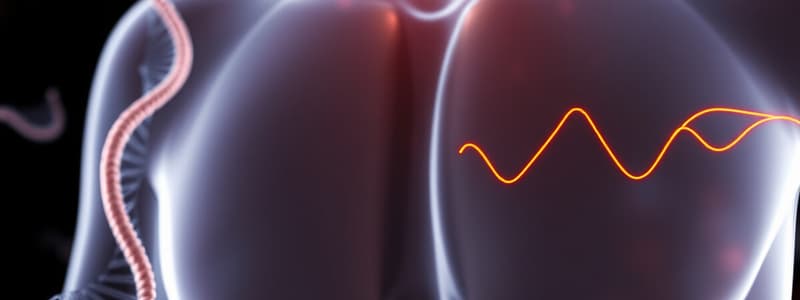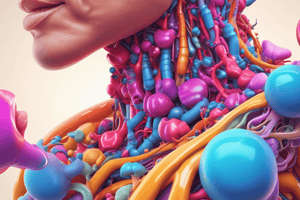Podcast
Questions and Answers
What role does thyroid hormone play at cold temperatures?
What role does thyroid hormone play at cold temperatures?
- It activates the thyroid hormone receptor. (correct)
- It inhibits the transcription of genes.
- It decreases metabolic rate.
- It has no effect on body temperature.
Which type of protein controls the transcription of genes?
Which type of protein controls the transcription of genes?
- Transcription factors (correct)
- Enzymes
- Transport proteins
- Structural proteins
How do endocrine glands release hormones?
How do endocrine glands release hormones?
- Along neural pathways
- Via the digestive system
- Directly into the bloodstream (correct)
- Through ducts
What is the function of the hypothalamus in temperature regulation?
What is the function of the hypothalamus in temperature regulation?
What type of transcription factor decreases the transcription rate?
What type of transcription factor decreases the transcription rate?
What happens to protein production when the transcription rate increases?
What happens to protein production when the transcription rate increases?
Which gland is responsible for producing adrenaline?
Which gland is responsible for producing adrenaline?
Which hormones are involved in the homeostatic control of blood sugar?
Which hormones are involved in the homeostatic control of blood sugar?
What is the primary effect of thyroid hormones on metabolism?
What is the primary effect of thyroid hormones on metabolism?
What is the relationship between hormone levels and transcription factors?
What is the relationship between hormone levels and transcription factors?
What is the function of transcription factors in relation to gene expression?
What is the function of transcription factors in relation to gene expression?
What happens to the thyroid hormone receptor at cold temperatures?
What happens to the thyroid hormone receptor at cold temperatures?
Which of the following best describes the role of the hypothalamus in regulating body temperature?
Which of the following best describes the role of the hypothalamus in regulating body temperature?
What is a characteristic difference between endocrine and exocrine glands?
What is a characteristic difference between endocrine and exocrine glands?
How do thyroid hormones affect metabolic rate?
How do thyroid hormones affect metabolic rate?
Study Notes
Thyroid Hormone Receptor and Metabolism
- Under normal conditions, the thyroid hormone receptor is a transcription factor that binds to gene DNA, reducing the transcription of genes linked to metabolic rate.
- Cold temperatures trigger the release of thyroxine from the thyroid gland, which activates the receptor, leading to an increase in transcription.
- Increased transcription produces proteins that enhance the metabolic rate, resulting in elevated body temperature.
Transcription Factors
- Transcription factors regulate gene transcription by binding to specific DNA sites near gene start points.
- Activators boost transcription rates, while repressors diminish them.
- Hormones can modulate the activity of transcription factors, influencing gene expression.
Endocrine Glands Overview
- Endocrine glands release hormones directly into the bloodstream instead of via ducts, distinguishing them from exocrine glands.
- Major endocrine glands include:
- Pituitary Gland: Often termed the "master gland," it regulates various bodily functions.
- Hypothalamus: Controls the pituitary gland and homeostasis, including temperature regulation.
- Thyroid Glands: Produce thyroid hormones that regulate growth and metabolism.
- Parathyroid Glands: Secrete hormones that manage calcium homeostasis.
- Pancreas: Functions as both endocrine (insulin, glucagon) and exocrine (digestive enzymes) gland.
- Adrenal Glands: Generate hormones like adrenaline (fight or flight response) and aldosterone (osmotic balance).
- Kidneys: Involve hormone production that affects red blood cell synthesis and vitamin D metabolism.
Thermoregulation
- The hypothalamus serves a critical role in maintaining constant body temperature through thermoregulation.
- It receives temperature data from thermoreceptors distributed throughout the body.
- Impulses from thermoreceptors travel via sensory neurons to the hypothalamus, which in turn sends signals through motor neurons to various effectors (muscles and glands).
- Effectors act to correct and stabilize body temperature when deviations occur.
Thyroid Hormone Receptor and Metabolism
- Under normal conditions, the thyroid hormone receptor is a transcription factor that binds to gene DNA, reducing the transcription of genes linked to metabolic rate.
- Cold temperatures trigger the release of thyroxine from the thyroid gland, which activates the receptor, leading to an increase in transcription.
- Increased transcription produces proteins that enhance the metabolic rate, resulting in elevated body temperature.
Transcription Factors
- Transcription factors regulate gene transcription by binding to specific DNA sites near gene start points.
- Activators boost transcription rates, while repressors diminish them.
- Hormones can modulate the activity of transcription factors, influencing gene expression.
Endocrine Glands Overview
- Endocrine glands release hormones directly into the bloodstream instead of via ducts, distinguishing them from exocrine glands.
- Major endocrine glands include:
- Pituitary Gland: Often termed the "master gland," it regulates various bodily functions.
- Hypothalamus: Controls the pituitary gland and homeostasis, including temperature regulation.
- Thyroid Glands: Produce thyroid hormones that regulate growth and metabolism.
- Parathyroid Glands: Secrete hormones that manage calcium homeostasis.
- Pancreas: Functions as both endocrine (insulin, glucagon) and exocrine (digestive enzymes) gland.
- Adrenal Glands: Generate hormones like adrenaline (fight or flight response) and aldosterone (osmotic balance).
- Kidneys: Involve hormone production that affects red blood cell synthesis and vitamin D metabolism.
Thermoregulation
- The hypothalamus serves a critical role in maintaining constant body temperature through thermoregulation.
- It receives temperature data from thermoreceptors distributed throughout the body.
- Impulses from thermoreceptors travel via sensory neurons to the hypothalamus, which in turn sends signals through motor neurons to various effectors (muscles and glands).
- Effectors act to correct and stabilize body temperature when deviations occur.
Studying That Suits You
Use AI to generate personalized quizzes and flashcards to suit your learning preferences.




